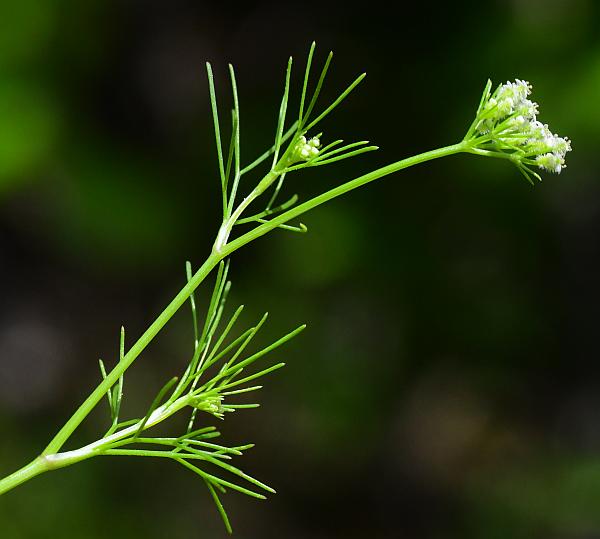Spermolepis echinata (Nutt. ex DC.) A. Heller
Hooked Scale-Seed

Native
CC = 3
CW = 3
MOC = 10
© SRTurner
Spermolepis echinata (Nutt. ex DC.) A. HellerHooked Scale-Seed | |
 |
Native CC = 3 CW = 3 MOC = 10 |
© SRTurner |
|
Family - Apiaceae Habit - Annual forb. Stem - Ascending to erect, to 40 cm, glabrous.
Leaves - Alternate, sometimes with 1 basal leaf present at flowering. Leaf blades 0.7-2.5 cm long, mostly ovate in outline, pinnately 2-4 times dissected, the numerous ultimate segments 1-25 mm long, narrowly linear, usually threadlike, glabrous, the basal petiolar sheaths not inflated.
Inflorescences - Terminal and axillary, compound umbels, usually long-stalked. Involucre absent. Rays 5-15, 1-12 mm long, unequal in length, strongly ascending, straight, the central umbellet of most umbels sessile and 1-or 2-flowered. Involucel of 1-3 bractlets, these mostly shorter than the flower stalks, linear, the margins sometimes minutely toothed. Flowers 1-6 in each umbellet. Flower stalks 1-7 mm long, the central umbellets often with the flowers sessile or nearly so.
Flowers - Sepals absent. Petals oblong to ovate, rounded at the tip, white. Ovaries densely pubescent with hooked bristles.
Fruits - Schizocarps 1.5-2.0 mm long, ovate in outline, flattened laterally, slightly narrowed along the commissures, glabrous, pubescent with hooked bristles, the mericarps with 5 inconspicuous, narrow, rounded ribs, these more or less obscured by the bristles.
Flowering - April - June. Habitat - Sand prairies, rock outcrops in upland prairies, igneous and chert glades, fields, roadsides, railroads, and sandy, open, disturbed areas. Origin - Native to the U.S. Lookalikes - Other species of Spermolepis. Other info. - This small and inconspicuous plant is uncommon in Missouri, mostly confined to just a few southeastern and southwestern counties. Beyond Missouri its range is mostly to our south. The plant is generally harder to find than to identify once discovered. It has highly dissected, threadlike leaves and tiny white flowers. The ovaries and fruits are densely covered with hooked bristles. The plant prefers sandy substrate. Photographs taken at Sand Prairie Conservation Area, Scott County, MO, 5-6-2020 (SRTurner). |